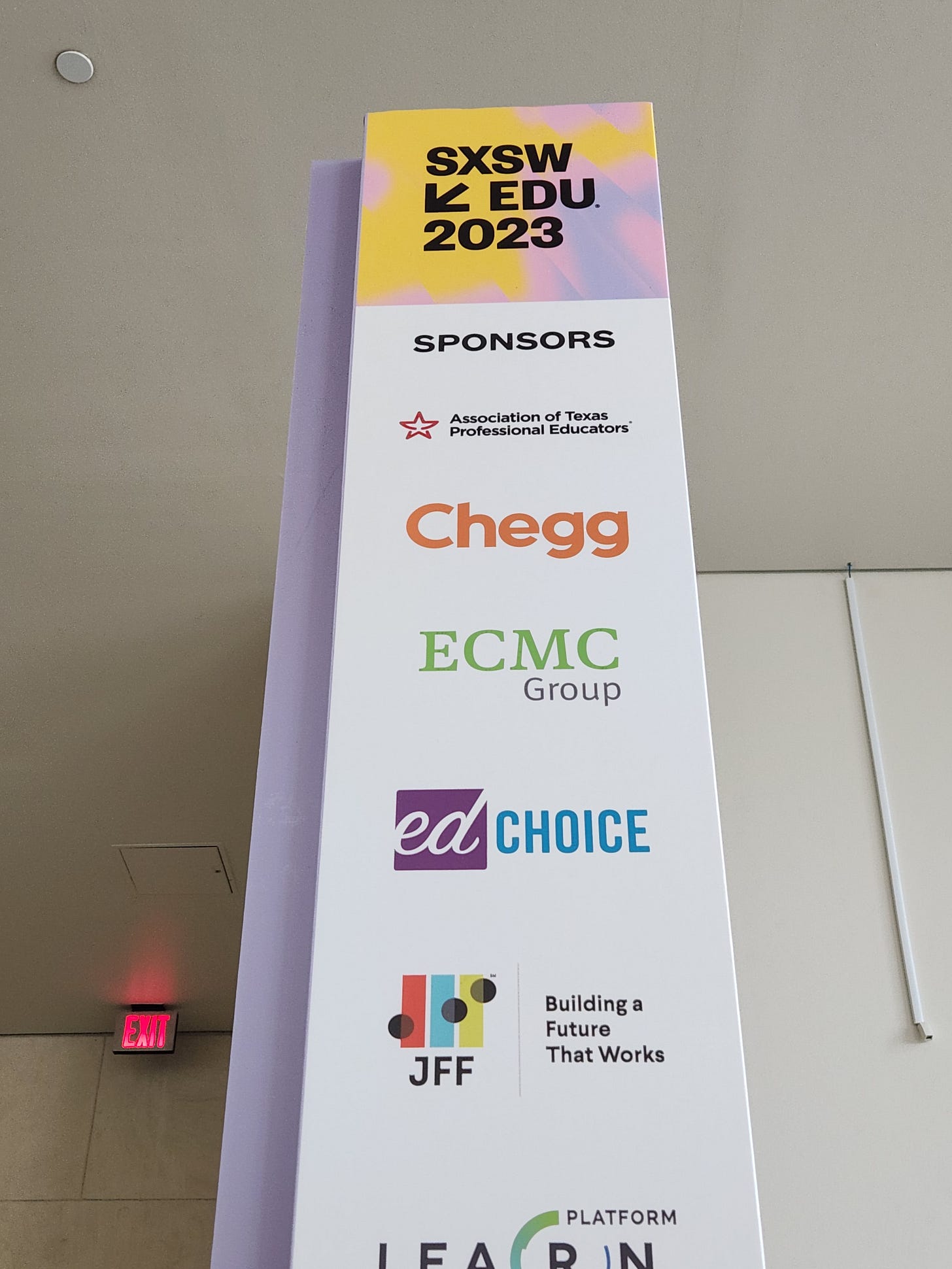SxSW Edu Goes Full Chegg
Plus, Inside Higher Ed and Chegg. Again. Plus, Australia says companies that use AI to facilitate cheating could be liable. Plus, Guess Who's Speaking in Vegas?
Issue 195
To join the 3,121 smart people who subscribe to “The Cheat Sheet,” enter your e-mail address below. It’s free:
If you enjoy “The Cheat Sheet,” please consider joining the 12 amazing people who are chipping in a few bucks a month via Patreon. Or joining the four outstanding citizens who are now paid subscribers! I don’t know how that works, to be honest. But I thank you!
SxSW Edu Goes Full On Chegg
Having just returned from SxSW Edu, one of the major education conferences in the country, I was disheartened to see the spectacle that comes along with allowing cheating providers such as Chegg to rub elbows with legitimate education providers and companies.
I use the word ‘allow’ because this was a choice. Chegg showed up with money. SxSW Edu took it.
There’s a little history (see Issue 187). But the newer history is that Chegg’s corrupted corporate brand was on full display to hundreds, even thousands of educators and education leaders, like it was normal. Like it was an education provider.
My snapshots:
And:
That’s bad.
But worse, SxSW Edu added a panel to the conference agenda not only including Chegg, but featuring it. The topic: Always On: Learning in the Age of AI & Technology.
The description innocently asks:
When it comes to educating the modern student in the digital age, how have academic institutions adapted or failed to recognize how students learn today? And most importantly, what changes are needed to modernize the approach to learning in a way that recognizes the role of technology in students’ lives?
Chegg’s entire business premise is that schools are terrible at modern teaching and Chegg can fill that gap by selling answers to assignments and tests, on demand, in minutes. Chegg isn’t selling textbooks anymore. Or tutoring. They literally closed down their tutoring service. They now nearly exclusively sell academic answers for money (see Issue 189).
And because Chegg used some of that answer money to pay this major education conference, they were granted stage time to talk about their core business premise - the supposed failure of schools to “recognize how students learn today.”
On the panel were a Chegg executive and Rose Luckin, of something called the UCL Knowledge Lab, affiliated with the University College, London. I don’t know her or it. Also joining Chegg was Paul Kim, the CTO of the graduate school of education at Stanford University. In November 2021, Kim was announced as a member of Chegg’s “academic advisory board” (see Issue 68). There’s no joke there. Except maybe to add that Kim’s bio says he wrote a book entitled, “MOOC Revolution.” So, there’s that.
But the big issue is the legitimizing of cheating, the whitewashing of it - something Chegg has invested heavily to do.
IHE and Paul LeBlanc - New Academic Integrity Concerns are “Myopic”
Speaking of organizations or institutions that are commercially compromised by Chegg and other cheating providers, we cannot overlook Inside Higher Ed (see Issue 78 or Issue 49 or Issue 102).
And this week, IHE published an opinion piece from Paul LeBlanc, President of Southern New Hampshire University (SNHU) and shockingly a compensated board member at Chegg. About which, I’ve never understood why the president of a non-profit being compensated to serve on the board of a for-profit cheating provider is not a daily scandal. IHE does not disclose LeBlanc’s position with Chegg.
In his piece, LeBlanc writes:
The reaction to ChatGPT in much of the higher education community has been focused on immediate questions, such as “How can we trust a college application essay any longer?” and “How do we rewrite our academic honesty policies to prohibit the use of ChatGPT—and how do we then police those policies?” Those are understandable concerns, but they are myopic.
Of course. Academic honesty policies and enforcing them - myopic.
Frankly, I’d kind of expect that SNHU would move to ban ChatGPT immediately, since it’s probably destroying Chegg’s profitability (see Issue 193).
But my bigger point is that, yet again, IHE has opened its pages to cheating allies who are all too happy to minimize and dismiss academic integrity.
Australia Says Using ChatGPT to Build Cheating Services is Illegal
I missed this from mid-January but reporting in Australia (subscription required) says that authorities can prosecute anyone who uses ChatGPT to build a service that helps Australian students cheat.
The headline is pretty concise:
Chatbot cheats face fines and, jail
The article is longer and, in great journalistic form, the first line of the story is the story:
Chatbot creators risk jail and stiff fines for “academic cheating’’ if they commercialise artificial intelligence to write student essays and assignments.
Yikes.
Australia has been the world leader in criminalizing academic cheating as well as taking administrative action. But this warning - that those who use AI to commercialize cheating could be on the legal hook in Australia - seems big.
The reporting continues that Australia’s education regulator says it:
defines an “academic cheating service’’ as one that provides work to, or undertakes work for, tertiary students on a commercial basis, as a substantial part of an assessment task they are required to undertake themselves.
“If they (chatbots) provide systems that allow work to be completed for an Australian tertiary student, it could fall under that Act,’’ [a professor said.]
Class Note:
I’m pleased to share that I will be the keynote speaker at the annual conference of the National College Testing Association (NCTA), in Las Vegas in August. NCTA’s announcement is here and I am excited for this outstanding opportunity to discuss academic integrity and misconduct.




